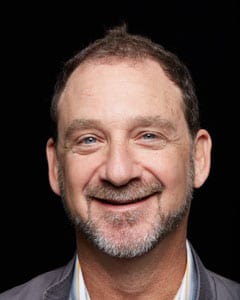Volunteer Spotlight: Michael Fratkin
Palliative care physician, pioneer of telemedicine and member of Compassion & Choices’ Healthcare Advisory Council, Michael Fratkin chooses to focus on people rather than illness.
by Sonja Aliesch
Dec 10, 2020
 Dr. Michael Fratkin was only nine when he first had a notion that would nudge him toward his life path of helping people. “My grandfather Willie was probably the most important person to me as a kid. He and my grandmother would come up from New York City to where I lived in upstate New York about every month. They’d bring all the groovy deli stuff and pastries, and we’d go visit them every few months,” he recalls. “Suddenly, after a year of that not happening, my dad told me he died.”
Dr. Michael Fratkin was only nine when he first had a notion that would nudge him toward his life path of helping people. “My grandfather Willie was probably the most important person to me as a kid. He and my grandmother would come up from New York City to where I lived in upstate New York about every month. They’d bring all the groovy deli stuff and pastries, and we’d go visit them every few months,” he recalls. “Suddenly, after a year of that not happening, my dad told me he died.”
Willy had been sick with prostate cancer, undergoing multiple surgeries, over that year. Fratkin’s parents hadn’t discussed it with him. “All of a sudden he was gone, and we were driving to New York City for his memorial,” he says. “There we were next day at the service with my whole extended family. They were patting me on the head, saying ‘He was such a great man,’ but I was mad. I felt isolated; they didn’t know what he was to me. I remember walking down the aisle in the little funeral-home chapel. It was an open casket. I stepped on a stool and looked down into it, and I had this realization: ‘Oh my God; that’s not him. This body of mine is not me.’ That was an empowering moment. I turned around and looked at all those people wearing black and wringing their hands, and I thought if that’s not him, who is ‘him’? Who is a person? What is a person? It gave me a sense that the world is built on a set of illusions and agreements that may or may not have much to do with reality. So that was sort of the breadcrumb I started to follow, the mysterious edge of things.”
Fratkin followed this direction on into the 1980s as a hospice volunteer. “HIV was killing lots of beautiful gay men, and I wondered what it was like to die when you’re 20, 24. The training introduced me to a lot of the thinking around death and dying.” He then completed EMT certification thinking he’d become a nurse or paramedic, but the doctors he worked with convinced him to become a doctor himself. He focused on HIV and end-of-life care before evolving to palliative care.
“I got sick of disease,” he explains, “of fancy medical treatments and all the technical stuff around taking care of sickness, because I was overwhelmed by how poorly we take care of people themselves in the face of serious disease. I was like a well-trained high-performance automobile mechanic who got sick of looking at engines and closed the hood of the car, then wandered over to the driver’s seat to open the door for people when their cars were no longer functioning. I was much more interested in the driver than the car. The same insight I had when I looked at the body of my dead grandfather: ‘That’s not him. It’s just a beat-up old jalopy that no longer runs.’ He was the driver. It’s the drivers that are the most interesting.”
Fratkin considers this concept — taking care of people, not patients — the “secret sauce” of palliative care. His work led him to found ResolutionCare in 2015, the first palliative care enterprise to employ telehealth platforms, which he prioritized from the beginning as an improvement over the arduousness of in-person visits for the very ill. “Fast forward six years where there’s a pandemic, and telemedicine is really a thing,” he says, noting that even post-Coronavirus, ResolutionCare staff will continue working 100% remotely as well instead of driving to the office.
Early in the pandemic, Fratkin joined Compassion & Choices’ recently launched Healthcare Advisory Council. This nationwide group of doctors, nurses, social workers, chaplains and other prominent professionals serves as a useful end-of-life care resource for clinicians. In that capacity, he has spoken in town halls to physicians across the country about the importance of telemedicine in providing high quality, equitable and person-directed care while managing the risk of getting COVID-19.
Accessibility to excellent care for everyone, everywhere remains the true motivator for Fratkin. “No one should be lacking in compassionate, thoughtful, wise guidance as they make their way through these hard moments.”


